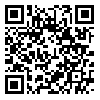Volume 17, Issue 1 (5-2018)
TB 2018, 17(1): 1-13 |
Back to browse issues page
Shahid Sadoughi University of Medical Sciences , shahla.sh62@gmail.com
Abstract: (3752 Views)
Introduction: Today, consuming junk foods and unhealthy snacks are very common in children. This study aimed to investigate the effects of parent education on reducing the consumption of unhealthy snacks in first and second elementary female students in Eghlid city.
Methods: In this experimental-interventional study,102 students of first and second grade (51 in the intervention group and 51 in the control group) participated. The intervention was in the framework of social-cognitive theory and two training sessions for parents during the group discussion and question and answer and distributing pamphlets. The data collection tool was a questionnaire designed to assess the impact of intervention in two stages, which was completed by parents before and three months after the intervention.
Results: After the intervention, the frequency of consumption of unhealthy snacks had a significant decrease in students (P=0.0001). However, significant changes was not observed in the control group ( p=0.352). There was a significant increase among structures of social- cognitive theory as well as Awareness (p=0.002), attitudes toward behavioral outcomes (p=0.0001), access p=0.001) and social support (p=0.0001).
Conclusion: According to the results, we can say that a family-based intervention based on parent education within the framework of social-cognitive theory can reduce the consumption of unhealthy snacks in primary school students
Methods: In this experimental-interventional study,102 students of first and second grade (51 in the intervention group and 51 in the control group) participated. The intervention was in the framework of social-cognitive theory and two training sessions for parents during the group discussion and question and answer and distributing pamphlets. The data collection tool was a questionnaire designed to assess the impact of intervention in two stages, which was completed by parents before and three months after the intervention.
Results: After the intervention, the frequency of consumption of unhealthy snacks had a significant decrease in students (P=0.0001). However, significant changes was not observed in the control group ( p=0.352). There was a significant increase among structures of social- cognitive theory as well as Awareness (p=0.002), attitudes toward behavioral outcomes (p=0.0001), access p=0.001) and social support (p=0.0001).
Conclusion: According to the results, we can say that a family-based intervention based on parent education within the framework of social-cognitive theory can reduce the consumption of unhealthy snacks in primary school students
Type of Study: Research |
Subject:
Special
Received: 2015/08/24 | Accepted: 2015/09/14 | Published: 2018/05/15
Received: 2015/08/24 | Accepted: 2015/09/14 | Published: 2018/05/15
| Rights and permissions | |
 |
This work is licensed under a Creative Commons Attribution-NonCommercial 4.0 International License. |



